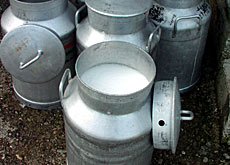
Milk industry cuts production to boost prices

Swiss milk producers are to cut production by about two per cent for the next year in a bid to keep demand steady and prices stable.
Faced with the worst crisis in the industry’s history, the Federation of Swiss Milk Producers (SMP) agreed the cut at its autumn meeting in Bern.
The move comes amid falling prices, a saturated market and sharply reduced cheese exports.
SMP president, Josef Kühne, said the production cut should halt further falls in the price of milk.
The SMP was expecting to take its proposals to the government, but on Wednesday cabinet took pre-emptive action and said it intended to allow the industry a free hand to set its own quotas for the next “milk year” (which runs from April to April).
“We are handing responsibility for fixing production quotas to the farmers and industry,” the economics minister, Pascal Couchepin, told swissinfo. “The industry will have to decide on which level they will be able to find a balance between price and quantity.”
He cautioned though that large cuts in output could jeopardise Switzerland’s market share of cheese in Europe. “If we reduce production too quickly, it could be difficult to keep market share… We think that a [maximum] reduction of 2.5 per cent is appropriate.”
Big enough?
The two per cent reduction will cut milk production by 60,000 tons a year (from total annual production of 3.2 million tons).
The SMP said at its meeting on Wednesday that there was a glut of milk on the market for the current year of some 200 million kilogrammes.
“Strictly speaking from an economic point of view, I’m not sure whether the two per cent cuts will be enough to stabilise prices and keep them high but the rates were agreed by everyone in the industry,” SMP manager, Stephan Hagenbuch, told swissinfo.
Painful situation
“We’ve got different problems,” said Hagenbuch. “Sales are down, prices are low on the world market and added to it is the collapse of Swiss Dairy Food.”
Cheese exports dropped 17 per cent in the first six months of this year compared to the equivalent period in 2001.
This year, European prices for dairy products, particularly cheese, have dropped 10-15 per cent while Swiss prices rose by five per cent.
“We must re-establish a balance between supply and demand as quickly as possible,” said the head of the Swiss Farmers Union, Jacques Bourgeois.
Meanwhile, in September, Swiss Dairy Food, the second largest dairy in the country, went into receivership.
Hagenbuch said that while some firms were doing well, all were affected by falling sales and over-supply.
Government plans
The SMP used its meeting to take aim at the government’s plans for the dairy industry.
It urged the reversal of planned subsidy cuts of SFr30 million – to SFr563 million – saying it amounted to a pre-programmed reduction in the milk price by May 2003.
Producers also slammed government plans to do away with production quotas by 2007. SMP deputy director, Kurt Nüesch, said the measure was being pushed through without sufficient research having been done, and was driven solely by the government’s desire to liberalise agriculture.
High prices
For its part, the Federal Office for Agriculture rebuts suggestions of over production saying that up to and including the beginning of this year, production was stable and sales were holding up.
“The problems are in export,” deputy director, Jacques Chavaz, told swissinfo. “And that’s not a problem of quantity but price.”
The fact remains that Swiss production costs remain much higher than those in neighbouring European countries.
High milk prices and a strong Swiss franc are crippling exports. Milk in Switzerland fetches prices of 77-79 centimes per kilo with organically produced milk fetching prices about 20 per cent higher. About half of Swiss milk goes into cheese production.
Free market
Chavaz said it made no sense to have production levels managed by state decree while pricing is determined by the market.
The government raised individual quotas of every milk producer in Switzerland by three per cent in 2000 and 1.5 per cent in 2001.
As for the future, the Swiss Milk Producers Association is not unduly pessimistic. “It’s a painful period but I think it’s going to pass and that the market will recover,” said Hagenbuch.
swissinfo, Vincent Landon
Switzerland produces 3.2 million tons of milk a year.
That represents about three per cent of EU production.
The price for milk is about 77-79 centimes per kilo.
Organically produced milk fetches 90+ centimes per kilo.
Half the milk is used in cheese production.
Emmi is Switzerland’s biggest dairy firm.
The second largest, Swiss Dairy Food, went into receivership last month.

In compliance with the JTI standards
More: SWI swissinfo.ch certified by the Journalism Trust Initiative

























You can find an overview of ongoing debates with our journalists here . Please join us!
If you want to start a conversation about a topic raised in this article or want to report factual errors, email us at english@swissinfo.ch.